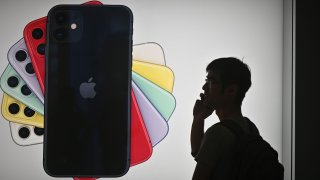
For a long time, many of us assumed that Apple devices were untouchable when it came to cyberthreats and malware because they’re too tough to hack, but not anymore: Recent attacks against Apple products are causing concern.
So, what can you do to keep your iPhones and iPads (and iEverything else) safe?
For starters: Don’t ignore operating system and app updates. They're how known security flaws are fixed, but it’s up to you to install them. To make sure your iPhone or iPad is up to date, go to Settings > General > Software Update.
On a Mac computer, go to Launchpad > System Preferences > Software Update.
Get top local stories in San Diego delivered to you every morning. >Sign up for NBC San Diego's News Headlines newsletter.
If your device isn’t getting OS updates because it’s too old, it’s time to replace it.
Consumer Reports also says you should beware of phishing attempts, one of the more common ways hackers get the goods. Most of the time, cybercriminals can only get access to a device if its owner gives them a way -- say, by clicking on a malicious link, an attachment in an email or even a social media post.
If you thought Apple products didn’t need antivirus software, think again. CR recommends AVG Antivirus for Macs. Testers found the free software easy to use and especially good at shielding online threats.
Local
On your iPhone, antivirus software can do things like block malicious websites, calls and texts. But because of Apple’s security restrictions, antivirus software can’t scan iPhones for viruses.
No matter what brand of device you use, protecting it and all your online accounts with a strong password is important. Use a long string of random words, numbers and special characters, something no one could guess. You should also consider using a password manager so you don’t have to remember all of them.



